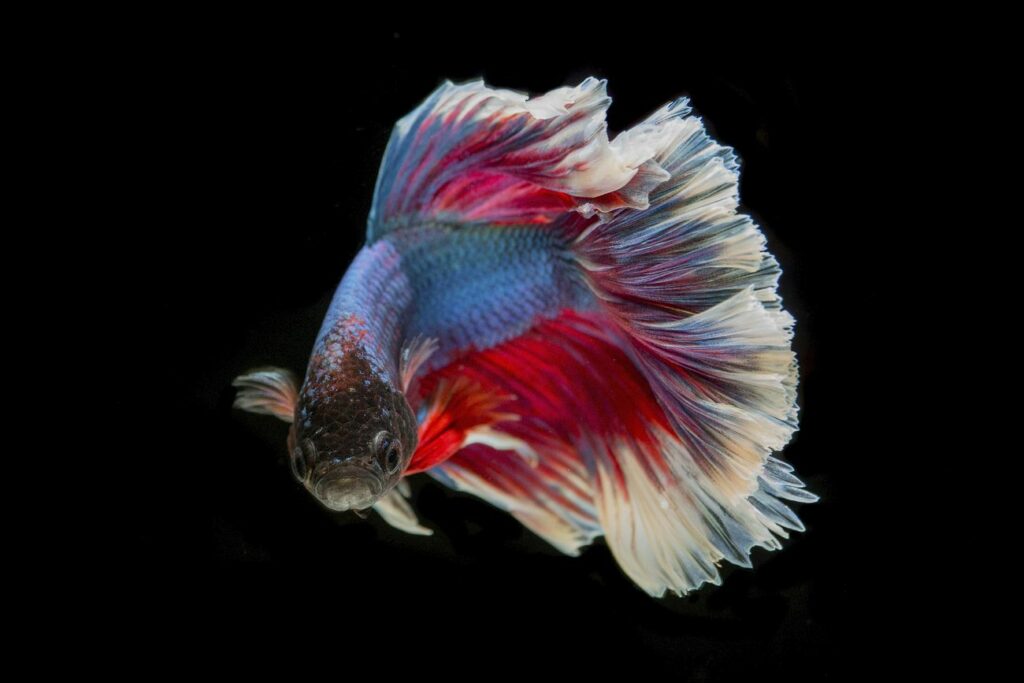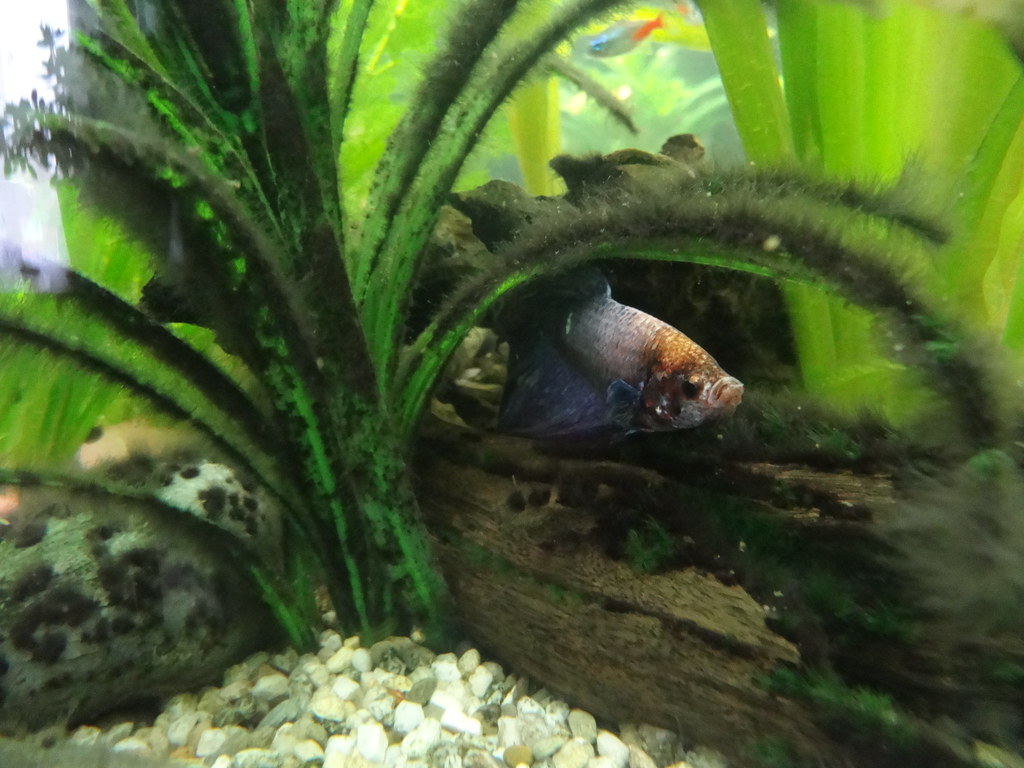Have you ever caught yourself wondering, “Do fish sleep? And more specifically, how do betta fish sleep?” You’re not alone. The sleeping habits of fish, particularly betta fish, are a common curiosity. It’s time we dived into this fascinating topic.
Understanding Betta Fish
An Introduction to Betta Fish
Betta fish, also known as Siamese fighting fish, are renowned for their vibrant colours and large, flowing fins. Originating from the warm, shallow waters of Southeast Asia, bettas are a popular choice for home aquariums due to their resilience and relatively easy maintenance.
Unique Characteristics of Betta Fish
One peculiar trait of bettas is their labyrinth organ. Ever wondered how they survive in low-oxygen water? It’s all down to this nifty organ that allows them to breathe air directly from the surface, just like you and me!

Sleep Patterns of Betta Fish
Do Betta Fish Sleep?
Alright, let’s clear the air: Yes, betta fish do sleep! It may look a little different from our human snoozing, but it is, in essence, their version of rest.
How Betta Fish Sleep: The Basics
Betta fish sleep mostly during the night, aligning their sleep patterns with the day-night cycle, much like many other diurnal creatures. The key is darkness. When it’s dark, bettas will take the chance to get some shut-eye.
Recognising a Sleeping Betta Fish
Visual Indications of a Sleeping Betta
Understanding the visual indications of a sleeping betta fish is important for fish owners to ensure they provide a suitable environment for their pet’s rest and well-being. Let’s explore the visual signs that indicate a betta fish is sleeping.
- Motionlessness: When a betta fish is asleep, it will exhibit a state of motionlessness. You may notice that the fish remains still and does not actively swim around the tank. This is a visual indication that the betta fish is in a sleep-like state.
- Horizontal Orientation: A sleeping betta fish often assumes a horizontal orientation in the water. Instead of maintaining an upright position, it may appear slightly tilted or lie on its side. This horizontal posture is a normal sleeping position for betta fish.
- Reduced Fins Movement: During sleep, a betta fish tends to reduce the movement of its fins. The usually vibrant and flowing fins may appear more relaxed and partially folded. This reduced fin movement is a visual indication that the fish is in a resting state.
- Slower Gill Movements: As a betta fish sleeps, you may observe that its gill movements become slower and less pronounced. The rhythmic opening and closing of the gills, which facilitate oxygen exchange, will be less active during sleep.
- Limited Response to External Stimuli: While a betta fish is sleeping, it may display a reduced response to external stimuli. Light tapping on the tank or movement in the vicinity may not elicit an immediate reaction from the sleeping fish. This decreased responsiveness is a visual indication that the betta fish is in a resting state.
- Eyes Partially Closed: When asleep, betta fish may partially close their eyes or have a drowsy appearance. The eyes may appear less alert and exhibit a more relaxed expression. This visual clue suggests that the fish is in a sleep-like state.
- Regular Sleep Patterns: Betta fish have their own sleep patterns and may exhibit regularity in their sleeping habits. You may notice that your betta fish prefers to sleep during certain times of the day or night, establishing a consistent sleep routine.
Behavioural Indications of a Sleeping Betta
Another indication is a sudden lack of activity. You know how betta fish are, always darting here and there. But when it’s time to rest, they slow down significantly, becoming very still and peaceful. Here are the behavioural indicators that your betta fish is sleeping.
- Resting Near the Bottom or in Hiding Spots: A sleeping betta fish often chooses to rest near the bottom of the tank or in hiding spots. It may seek out plants, caves, or other structures where it feels secure and comfortable during sleep. This behaviour indicates that the fish is actively seeking a suitable place to rest.
- More Reserved or Calm Behaviour: Sleeping betta fish may display a more reserved or calm behaviour compared to their active state. They may appear less alert and less inclined to interact with their surroundings. This behavioural change suggests that the fish is in a resting state.
- Gradual Waking Up: When a betta fish is awakening from sleep, it may exhibit gradual signs of becoming more active. You may observe an increase in swimming behaviour, fin movements, and responsiveness to external stimuli as the fish transitions from a sleep-like state to an awake state.
Where do Betta Fish Sleep?
Bettas can sleep almost anywhere in their tank — from the cosy bottom to the leafy confines of a plant. However, they are partial to quiet, secluded spots where they can rest undisturbed.

What Influences Betta Fish Sleep?
Environmental Factors
Factors like lighting, temperature, and tank design can greatly impact a betta fish’s sleep. A well-lit, adequately warm, and comfortably designed tank can help promote healthy sleeping patterns.
Health and Age Factors
Just like in humans, the health and age of a betta can also affect their sleep. A sick or old betta might sleep more, while a young, healthy one would have shorter sleep periods.
Improving Betta Fish Sleep
Tank Environment Enhancements
Enhancing the tank environment can help minimise stress, provide a sense of security, and promote optimal sleep for betta fish. Here are some tank environment enhancements that can improve the sleep quality of betta fish.
- Provide Adequate Hiding Places: Betta fish naturally seek out hiding spots to rest and sleep. Incorporate live or artificial plants, caves, and other structures to create hiding places in the tank. These hiding spots provide betta fish with a sense of security, allowing them to retreat and sleep undisturbed.
- Ensure Sufficient Darkness: Betta fish require a period of darkness to facilitate proper sleep. Maintain a consistent light cycle by providing a dark period during the night. Use a timer to control the tank’s lighting, ensuring that the betta fish has uninterrupted darkness for at least 8-10 hours per day.
- Adjust Lighting Intensity: Consider the intensity of the tank lighting to create a soothing environment for betta fish. Harsh and bright lighting can be stressful and interfere with their sleep. Use gentle, subdued lighting such as low-intensity aquarium lights or dimmer switches to create a calming ambiance.
- Ensure Proper Water Filtration and Flow: Adequate water filtration and flow are essential for maintaining water quality and oxygenation. Choose a filter that is appropriate for the tank size and provides sufficient water circulation without creating strong currents that may disturb the betta fish during sleep. Adjust the filter flow rate if necessary to create a gentle and consistent water movement.
- Regular Tank Maintenance: Maintaining a clean and well-maintained tank is crucial for betta fish sleep. Perform regular tank maintenance, including partial water changes, gravel vacuuming, and cleaning of decorations. This helps prevent the accumulation of waste and debris that can contribute to poor water quality and disrupt the sleep of betta fish.
- Avoid Overcrowding: Overcrowding in the tank can lead to stress and discomfort for betta fish, affecting their sleep quality. Ensure that the tank provides sufficient space for the betta fish to swim and rest comfortably. Follow appropriate stocking guidelines and avoid adding too many fish or incompatible tankmates that may disrupt their sleep.
Proper Feeding for Quality Sleep
Did you know that overfeeding can disturb your betta’s sleep? Stick to a balanced diet and proper feeding schedule to ensure they get quality rest.
Conclusion
Understanding how betta fish sleep helps us provide better care for these aquatic pets. Whether it’s enhancing their tank environment or optimising their feeding schedule, every little change can significantly improve their sleep quality and overall wellbeing. So, the next time you see your betta lying still at the bottom of the tank, remember, they’re probably just catching some z’s.
Do betta fish sleep with their eyes open?
Yes, betta fish do sleep with their eyes open. They lack eyelids, so they can’t close their eyes.
Can betta fish sleep too much?
Yes, like any creature, bettas can oversleep, usually due to illness, stress, or poor water conditions.
How long do betta fish sleep?
Betta fish typically sleep for several hours at night, but it can vary depending on their health and age.
Do betta fish like darkness for sleeping?
Yes, betta fish prefer darkness for sleeping. It’s recommended to turn off the aquarium lights at night.
What should I do if my betta fish isn’t sleeping?
If your betta fish isn’t sleeping, it may be due to stress, poor water conditions, or illness. Check their environment and consult a vet if necessary.

